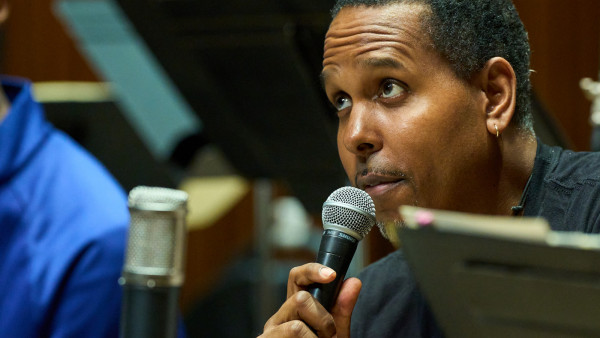Jazz at Lincoln Center Orchestra with Wynton Marsalis, Barbican — a century of jazz history
The Jazz at Lincoln Center Orchestra signalled its balance of orchestral jazz spectacle and nightclub intimacy from the start. A fanfare of trumpets was answered by a sheen of reeds before a froth of swapped phrases unfolded over springy walking-bass swing. Ensemble muscle established, Wynton Marsalis emerged from the trumpet section, improvising intensely, chorus after chorus, with just the rhythm section accompanying him.
Marsalis, a superb technician, welds classic jazz references into a modal jazz palette. As his solo unfolded, he injected the growls, slurs and blares of jazz’s formative years into a stream of modernist lines, holding the audience in his palm. But he is not the orchestra’s only star turn. Dan Nimmer on piano came next, with offbeat stabs and soulful asides, then Elliot Mason on trombone, broody, sharp-edged and technically astute. A poised ballad showcased trumpeter Marcus Printup’s lyricism and control.
Fifteen strong voices are melded into this disciplined jazz orchestra, and each one is capable of giving a century of jazz history a twist, both in their playing and in their original work. Those first two unannounced numbers were from the three-part “Offertory” of Marsalis’s Abyssinian Mass, a large-scale work celebrating the 200th anniversary of Harlem’s Abyssinian Baptist Church. The final part, “(You Gotta Watch) The Holy Ghost”, closed the first set with an array of gospel piano riffs, orchestrated squeaks of saxes and drummer Obed Calvaire slapping off-kilter beats on tambourine; his bass drum delivered rhythmic support.
Elsewhere in the forward-looking first set, trombonist Chris Crenshaw’s “Conglomerate” from his The Fifties: A Prism referenced cool school voicings and had baritone sax and trumpet duetting in a piano-free quartet. The otherworldly vibe of Wayne Shorter’s “The Three Marias” gained an orchestral shape alongside sour sustains from Chris Lewis’s soprano sax. Printup’s “Great Love (For Joe)” was dedicated to JLCO’s late baritone saxophonist Joe Temperley. Paul Nedzela on baritone sax enchanted with his upper-register control, warm-hearted balladry and final unaccompanied flourish.
The second half showcased the orchestra’s grasp of jazz history alongside mastery of Duke Ellington’s sonic palette. “Trombonio Bustoso Issimo”, an in-depth showcase for Mason’s fluent trombone, was followed by “Big Fat Alice’s Blues”, a feature for Sherman Irby’s alto sax. Irby, relaxed, spacious and unhurried, moved from Ellingtonia to modernism and raised the crowd. Later, Alexa Tarantino delivered an equally sustained performance on clarinet on one of four excerpts from Ellington’s Toot Suite.
Modal jazz was referenced with McCoy Tyner’s “The Man from Tanganyika”, Jelly Roll Morton by an impromptu jam, and the finale was a roaring blues. The encore, with Marsalis and rhythm section alone, segued Morton’s “Dead Man’s Blues” with the modern jazz balladry of “Embraceable You”. Rodgers and Hart’s “Blue Room” ended the evening, scored by Eddie Durham in the 1930s, and now bought to life by the reeds and brass of this remarkable band.
by Mike Hobart
Source: Financial Times

